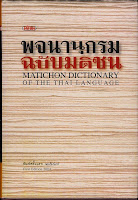Farang is one of the first words that will stand out from the jumble of Thai constantly spoken on all sides. People are likely to be saying things like, "Come take this farang's order, my English is terrible," or "Help! I can't make head nor tail of what the farang wants." If you're in a place where foreigners don't frequent, you're likely to hear it randomly shouted at your very presence, by staring children and adults alike.
For the most part, it's used harmlessly. Some people take it as an insult, but I don't. If somebody uses it like it's my name, I might let them know. Thais generally mean no harm by the word, even if they tend to overuse it.
The etymology behind the word farang is relatively clear, but some persistent folk etymologies muddy the waters. I don't want to get too much into tracing the history of the word right now, though.
The short version: farang doesn't come from the Thai word ฝรั่งเศษ /farangseet/ "France", since its use predates their arrival in Thailand; nor does it come from the fact that white people have skin like the inside of a guava. Likely cognates of farang are found in many languages and many countries, stretching from the Middle East out to Oceania. It was almost certainly spread by Persian traders across mainland Asia many centuries ago. Such Persian traders arrived in Siam by the 16th century, bringing along with their wares the word farangi, meaning Westerner or white man, from Arabic faranji, and ultimately referring to the Germanic tribe the Franks, dating from the crusades, perhaps as early as the turn of the first millennium, A.D.
Yes, that really is the short version.
The so-called farangs have shared their appellation with many things in Thai. The guava, known as ฝรั่ง farang in Thai, is native to the Americas and was most likely introduced to Southeast Asia by the Portuguese. In the early 19th century, John Crawfurd wrote of a fruit the Thais called "banana of the Franks (Kloa-Farang)", or กล้วยฝรั่ง /kluai farang/. (Note: Crawfurd states that the guava is called "malako" and the papaya "kloa farang", but I believe he must have simply reversed the two.) So the fruit gets its name from the foreigners who introduced it, and not the other way around.
It's not just guavas, though. Many things introduced by westerners are called "X farang", which is to say, "the farang version of X".
Common ones include:
- มันฝรั่ง /man farang/ = potato (มัน /man/ is a general word for tubers, thus potatoes are "farang tubers").
- หมากฝรั่ง /maak farang/ = chewing gum (หมาก /maak/ is betel, thus gum is "farang betel").
- หน่อไม้ฝรั่ง /nɔɔ maai farang/ = asparagus (หน่อยไม้ /nɔɔ maai/ are bamboo shoots, thus asparagus is "farang bamboo shoots").
- ผักชีฝรั่ง /phak chii farang/ = parsley (ผักชี /phak chii/ is cilantro/coriander, thus parsely is "farang cilantro").
- น้ำอบฝรั่ง /nam op farang/ = western style perfume, alcohol-based; now called น้ำหอม /nam hɔɔm/ "fragrant liquid", which is more widely used today than traditional น้ำอบ /nam op/.
- ดีเกลือฝรั่ง /dii klɨa farang/ = epsom salts, though simply ดีเกลือ /dii klɨa/ is now widely used to refer to them.
In cases like these, the original word tends to be replaced with a retronym by adding ไทย "Thai"; that is, it must be renamed to differentiate it. (Like how before digital clocks, there was no such thing as an "analog clock"-- it was just called a clock.) So today there is น้ำอบไทย /nam op thai/ and ดีเกลือไทย /dii klɨa thai/ due to the popularity of their western counterparts.
In addition to asparagus and potatoes, there are several more plant species not native to Southeast Asia that are known as the "farang" version of some other common plant.
These include: แคฝรั่ง, ตะขบฝรั่ง, ผักบุ้งฝรั่ง, ประทัดฝรั่ง, แพงพวยฝรั่ง, มะกอกฝรั่งม, หางนกยูงฝรั่ง, and อังกาบฝรั่ง. You can search for *ฝรั่ง in RID for more details.







